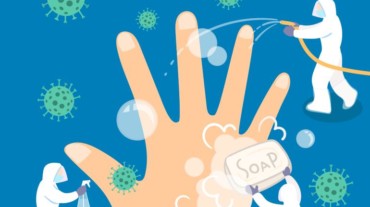
You think you are doing whatever it takes to prevent coronavirus? Well, still it is not enough. We are wearing masks every time we are stepping out of our homes thinking that it will protect us from the covid-19 virus but if you are not sterilizing it once you are back in home then still you can land up in trouble.
According to a study, the novel coronavirus that causes COVID-19 can remain infectious on face masks for up to a week. Not just that, the study also says that it can last on banknotes, stainless steel, and plastic surfaces for days.
However, the virus can be killed by household disinfectants, bleach or frequent hand washing with soap and water, said the researchers from the University of Hong Kong (HKU).

The virus has a different duration of stay for different surfaces and temperature
The study found that the COVID-19 virus can stick to stainless steel and plastic surfaces for up to four days, and to the outer layer of a face mask for a week, Hong Kong-based South China Morning Post (SCMP) reported on Monday.
The report, published in The Lancet journal, adds to a growing body of research about the stability of SARS-CoV-2 — as the novel coronavirus is formally known — and what can be done to prevent its transmission.
“SARS-CoV-2 can be highly stable in a favourable environment, but it is also susceptible to standard disinfection methods,” said the researchers, including Leo Poon Litman and Malik Peiris, both from HKU’s School of Public Health.
The researchers tested how long the virus could remain infectious at room temperature on a variety of surfaces.
Also, watch:
On printing and tissue paper it lasted less than three hours, while on treated wood and cloth, it had disappeared by the second day.
On glass and banknotes, the virus was still evident on the second day, but had gone by the fourth, while on stainless steel and plastic it was present for between four and seven days.
Select Topics of your interest and let us customize your feed.
PERSONALISE NOW“Strikingly,” the researchers said, there was still a detectable level of infection on the outer layer of a surgical face mask after seven days.
Peiris said:
This is exactly why it is very important if you are wearing a surgical mask you don’t touch the outside of the mask.
“Because you can contaminate your hands and if you touch your eyes you could be transferring the virus to your eyes,” he was quoted by SCMP.
On all surfaces, the concentration of the virus reduced quite rapidly over time
The researchers said that the results did “not necessarily reflect the potential to pick up the virus from casual contact,” as the presence of the virus in the study was detected by laboratory tools, not fingers and hands as would be the case in everyday life.

A study by American researchers on the environmental stability of the coronavirus published last month in the journal Nature also concluded that it can remain infectious on some surfaces for days.
They found the virus was present on plastic and steel for up to 72 hours but did not last more than four hours on copper or 24 hours on cardboard. The findings from HKU add to the conversation about public health and hygiene, and what kinds of precautions people should take when bringing items like groceries into their homes.
Poon said handwashing remains at the top of the list, and it was theoretically possible for tins of food to carry enough live virus to cause an infection, but that the exact risk is yet to be established.
Washing and sanitizing hands is the only solution
“If you want to protect yourself just maintain good hygiene, wash your hands often and try not to touch your face, your mouth or nose without cleaning first,” he said.

People who were particularly concerned might prefer to leave non-perishable items in their shopping bags in the kitchen for a day before handling them, he said.
“That would reduce the viral concentration a lot. But the most important message is to wash your hands,” he concluded.
So, you have got the message. Also, while shopping if possible try doing online transfer instead of cash payment to prevent covid-19 virus.